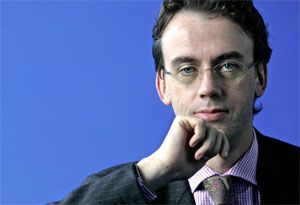
| |
Not everyone receives an invitation to appear at the famous Edinburgh Festival, but the history of the relationship between the Mariinsky Theatre and the festival began back in the 1990s – what prompted this friendship?
My personal relationship with the Mariinsky Theatre dates back about fifteen or sixteen years when I was the Director of Melbourne International Arts Festival, in Australia. And we were able to bring the Mariinsky in 2001 to the Melbourne Festival with Richard Strauss’s Salome. It had many logistical challenges, but also presented undoubted artistic spurs.
The history of the Mariinsky Opera Company’s relationship with the Edinburgh Festival started even earlier – in 1991 when my predecessor brought the then not-so-well-known maestro Gergiev and the Mariinsky Opera (known as Kirov at that time) to the festival for one week of Musorgsky operas. It was an absolute triumph. People who had not known about maestro Gergiev and his great company were really amazed by what they heard and what they saw.
Subsequently, maestro Gergiev came to the festival a couple of times, and then not so often until I came there as the Director (in 2007) when they came back. In 2008, maestro Gergiev and the London Symphony Orchestra brought a complete programme of Prokofiev symphonies and violin concertos. It was a fantastic artistic collaboration. Within the festival programme, we also staged Rodion Shchedrin’s opera The Enchanted Wanderer, Sergei Rachmaninoff’s Aleko and also Act III from Sergei Prokofiev’s Semyon Kotko, not to mention a personal premiere by Gergiev himself – in a co-production of Karol Szymanowski’s Król Roger with the Wrocław Opera.
This year the Mariinsky Theatre is taking Jonathan Kent’s 2009 production of Richard Strauss’ opera Die Frau ohne Schatten to the festival – why was this opera chosen?
My goodness, I would say this is an amazing masterpiece, but more than that it’s a perfect production for the year we are exploring. Aspects of the relationship between the idea of Europe and the idea of Asia, both real and magical, cultural and social collaboration between the continents. It recreates an idealised world of shades, so in this world of shades – or the spirit – you can see this idea of temptation, which is very ancient indeed in fiction. For that reason it is a very important production and with such wonderful musicians. And it’s a great opportunity to continue this collaboration. And, of course, we are in the process of discussing plans for future years: projects we are looking forward to in the future, in 2012 and beyond.
How do you plan the programme?
Every festival director thinks about the programme in his own way. My way of deciding is to try to get together a series of ideas which are very artistic, very much of the description of how the arts represent themselves. And also how the arts can elevate themselves beyond just a conversation about these sorts of avenues. In 2008 it was an exploration of what it means to be Europeans, to be part of Europe, a conversation about Europe and how the European community is expanding.
What are the selection criteria for becoming involved in the Edinburgh Festival?
We don’t have any one single selection procedure. With every specific ensemble or production we have a separate meeting and, of course, we have an individual approach to each of these. But the basic principle still lies in bringing ideas together rather than bringing stars together like other festivals. The task of the Edinburgh Festival is to bring together that which is completely new and that which is already well-known. It is not just traditional and not just contemporary and experimental, but both together.
What is the concept for this year’s festival?
Now we are looking at the importance of relations between Europe and Asia. In banking, in economics, in politics and so on, the problems that have come up in cultural and scientific conversations for thousands of years. How it’s important to remind ourselves constantly about those relationships. That’s what I’m trying to do this year: to hold a broader conversation about perceptions of life, the world we live in and how the arts contribute to this conversation. How European artists were inspired by Asian cultures, people like Debussy, who was influenced by the music of Java and Japan, or Stravinsky. And how the artists of Japan, for example, create something new in the modern cultural environment. This influence is not in one direction, it’s in both directions. European composer Jonathan Harvey, for example, a Buddhist, who was hugely influenced by eastern mysticism as a concept in his work, or Toshio Hosokawa – a contemporary Japanese composer who writes contemporary music today. That’s a good example. There will be a world premiere of Toshio Hosokawa’s work Blossoming, commissioned by Edinburgh Festival. It was inspired by Ikebana, the Japanese art of flower-arranging.
Which countries will be represented at the festival this year?
It’s almost all about Asia. The counties we are focussing on are South Korea, China, India, Japan, Indonesia, and Vietnam. And of course many European countries, including Russia.
What makes Russian musical theatre today stand apart? Are there still many differences in the national schools? How do you see the traditions and do you see any differences in them? Does Asia still preserve its traditions while in Europe everything has been generalised and blended together?
Both at the same time. And I think there are many different tendencies and it’s very interesting to think about new production trends. But I would say however, one of the big differences is the idea of the repertoire company – which is common for Poland, Russia, Hungary, Romania – it’s a longer and slower process. You can have a group of actors working on a role for months and it involves a great amount of time, and I think, it is much more profound. While in France and Germany, in Western Europe in general – it is much more instantaneous.
Talking about the Mariinsky there is another dimension which should be noted: this company is a family and there is definitely a very strong in-house style both in repertoire and in the way of making productions. It’s very international as well, many stage directors are coming from all over the world. Somehow when they come to the Mariinsky they work in a very special distant way, like Jonathan Kent, who is well known in the UK, but in the UK they might not achieve the kind of results that his production here has done. There is a marriage between the personal aesthetics and the company which results in these remarkable productions. It’s a very remarkable and a very active collaboration. The Mariinsky is a company which has created a capacity … to do many things and they expand together as a group. It’s not just each individual doing his or her job, but they all work together for a common aim. For me that’s the important thing that sets the Mariinsky apart from other theatres.
What is remarkable about maestro Gergiev is, first and foremost, that he always amazes the world with his new projects, for example taking Prokofiev to the West where he is not so well known. Or selecting an original programme of rarely performed and unfamiliar works by a composer, or choosing a staging team that can create a totally unique production.
What stands out for you in the Mariinsky Theatre repertoire and what are your own personal tastes in music?
I absolutely love War and Peace by Andrei Konchalovsky and The Fiery Angel – a co-production with Covent Garden by David Freeman, and also Semyon Kotko by Yuri Alexandrov. I’m a contemporary composer, so it shouldn’t be surprising that my personal interest is in modern music, although it doesn’t mean I don’t like art which is more traditional; I’m just not following a line of one dimension. Among living Russian composers I’d highlight Shchedrin, Slonimsky and Gubaidulina. I also like the fantastic Georgian composer Giya Kancheli very much. When we think about Russian composers we need to move the boundaries further back to include the territories of the former Soviet Union, because there is still an influence of the Soviet school. So being Russian is not a limiting nationalistic idea, it looks simultaneously to the East and the West.
Speaking with Anastasia Grib |
